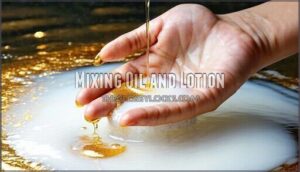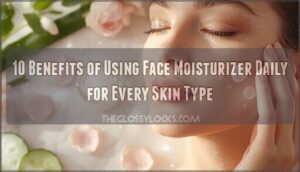This site is supported by our readers. We may earn a commission, at no cost to you, if you purchase through links.

Body oils create a protective barrier that locks moisture deep into your skin, making them perfect for dry conditions or when you need that extra hydration boost.
Lotions, on the other hand, absorb quickly and won’t leave you feeling like you’ve been dipped in olive oil.
If you’ve got oily skin, lotion’s your friend. Dry skin? Oil’s got your back.
The texture difference is night and day—oils feel luxurious but take time to absorb, while lotions disappear fast.
Your skin type and climate preferences will guide your choice, though mixing both might discover the perfect moisture balance.
Table Of Contents
- Key Takeaways
- Body Oil Basics
- Body Lotion Essentials
- Oil Vs Lotion Differences
- Choosing Body Oil
- Choosing Body Lotion
- Applying Body Oil
- Mixing Oil and Lotion
- Frequently Asked Questions (FAQs)
- Is it better to use body oil or lotion?
- Do dermatologists recommend body oil?
- Is it okay to use body oil every day?
- Should you put body oil or lotion on after shower?
- Should you use body oil every day?
- Is body oil or moisturiser better for dry skin?
- What is the best oil for the body?
- Can body oil help with eczema?
- Is body lotion suitable for tattoos?
- How do I store body oil properly?
- Conclusion
Key Takeaways
- You’ll get better results with body oil if you have dry skin or live in cold climates, since it creates a protective barrier that locks moisture in for 8-12 hours, while lotion works best for oily skin and provides quick absorption without greasy residue.
- Apply body oil to damp skin right after showering using circular motions to maximize absorption, or layer lotion first followed by oil to combine water-based hydration with long-lasting moisture protection.
- Your skin type determines the winner – dry and mature skin thrives with oils like jojoba or argan, while oily and acne-prone skin needs non-comedogenic lotions that won’t clog pores.
- You don’t have to choose just one – mix both products strategically by using oil during winter months for intense hydration and switching to lotion in summer for lightweight daily moisture.
Body Oil Basics
Body oils are pure, plant-based moisturizers made from natural ingredients like jojoba, almond, and coconut oils that create a protective barrier on your skin.
Pure botanical oils wrap your skin in nature’s protective embrace, locking in moisture with every luxurious drop.
They work by forming an occlusive layer that prevents moisture loss, making them particularly effective when you apply them to damp skin after showering.
Natural Ingredients
When you’re choosing body oil, you’re basically picking nature’s best skincare ingredients.
Plant-based oils like jojoba, argan, and coconut deliver essential oil benefits through their antioxidant properties. These natural ingredients from plant extracts offer non-comedogenic ingredients that won’t clog your pores.
Many brands now prioritize sustainable sourcing, ensuring your skincare routine supports both healthy skin and environmental responsibility. You can even find a wide variety here.
Occlusive Properties
Body oils act as powerful occlusives, creating a protective lipid barrier that prevents transepidermal water loss.
This barrier formation locks moisture beneath your skin’s surface, offering superior moisture retention compared to lighter products.
The occlusive properties provide environmental protection against harsh weather conditions, strengthening your natural skin barrier function and maintaining hydration levels throughout the day, which is a key factor in moisture retention.
Application Methods
Applying body oil correctly transforms your skincare routine from basic to brilliant. The key lies in timing and technique for maximum absorption.
Here are four essential application methods:
- Post-Shower Timing – Apply to damp skin within three minutes of bathing
- Circular Motions – Massage using gentle, upward circular movements
- Layering Products – Use body lotion first, then seal with oil
- Application Frequency – Apply daily for consistent hydration results.
For best results, consider using wooden combs benefits to evenly distribute the oil.
Body Lotion Essentials
Body lotion combines water, oils, and emulsifying agents to create a lightweight formula that absorbs quickly into your skin.
You’ll find that this water-based moisturizer provides effective hydration while feeling less greasy than pure oils, making it suitable for daily use across different skin types.
Water-Based Formula
Unlike body oils, moisturizing lotion features a waterbased formula that creates superior skin penetration and faster absorption rate.
This lightweight composition combines water with oils, allowing deeper skin hydration without heavy residue.
The formula stability guarantees consistent ingredient interactions that boost hydration levels effectively, making skin moisturizing feel invigorating while delivering essential moisture where your skin needs it most, due to its high water content.
Emollient Properties
Most lotions pack emollient benefits that work like tiny repair crews for your skin barrier.
These ingredients smooth rough patches by filling gaps between skin cells with essential lipids.
While they’re not as occlusive as pure oils, emollients excel at skin softening and reducing irritation.
They create natural smoothness by mimicking your skin’s own protective structure.
Many also contain nourishing ingredients such as coconut oil, which provides additional nourishing benefits.
Hydration Benefits
Drawing moisture from the air, body lotions excel at delivering long-term moisture through their water-based formula.
You’ll notice improved skin barrier function as ingredients like hyaluronic acid and ceramides work together.
This nutrient delivery system supports sebum regulation while maintaining ideal skin hydration.
The result? Enhanced skin moisturization that creates a naturally glowing appearance without heavy residue, promoting naturally glowing skin.
Oil Vs Lotion Differences
When you’re choosing between body oil and lotion, you’ll notice clear differences in texture, absorption rate, and how they work on your skin.
Body oil creates a protective barrier that locks in moisture for hours, while lotion absorbs quickly and provides immediate hydration without leaving a greasy residue, offering a distinct choice based on immediate hydration.
Texture Comparison
You can immediately feel the difference when you compare these moisturizers.
Body oil creates a rich, protective layer that absorbs slowly, while body lotion penetrates quickly with minimal residue.
The texture contrast affects your daily routine and comfort level.
| Aspect | Body Oil | Body Lotion |
|---|---|---|
| Feel | Heavy, luxurious coating | Light, smooth application |
| Absorption | Slow oil absorption process | Fast lotion absorption rate |
| Residue | Potential surface residue | Minimal to no residue |
Moisturizing Effects
Your skin experiences vastly different moisturizing effects depending on your choice.
Body oil creates superior moisture retention through deep nourishment, strengthening your skin barrier for extended hydration duration.
Meanwhile, body lotion provides immediate comfort with balanced sebum regulation.
Here’s how these moisturizing approaches compare:
| Moisturizing Aspect | Body Oil Benefits | Body Lotion Benefits |
|---|---|---|
| Hydration Duration | Lasts 8-12 hours | Requires reapplication every 4-6 hours |
| Skin Barrier Function | Forms protective seal | Repairs with ceramides and peptides |
| Deep Nourishment | Penetrates skin layers completely | Surface-level hydration with quick absorption |
| Moisture Retention | Prevents water loss effectively | Attracts moisture but may evaporate faster |
Skin Type Suitability
Your individual skin characteristics determine which moisturizer works best for your needs.
Body oils excel for dry skin and mature skin types, creating protective barriers that prevent moisture loss. Lightweight lotions suit oily skin and acne-prone complexions better, avoiding pore congestion while providing hydration.
For ideal results, consider how skin type impacts your choice.
| Body Oil Works Best For | Body Lotion Works Best For |
|---|---|
| Dry skin needing deep moisture | Oily skin requiring lightweight hydration |
| Mature skin lacking natural oils | Acne-prone skin avoiding comedogenic ingredients |
| Sensitive skin preferring minimal ingredients | Combination skin needing balanced moisture |
| Winter dryness and harsh climates | Summer heat and humid conditions |
Choosing Body Oil
You’ll want to choose body oil when your skin feels persistently dry, cracked, or rough, especially during cold weather months.
Body oil works best for people with naturally dry skin who need intense moisture that lasts longer than traditional lotions can provide, offering a solution for those who require persistent hydration.
Dry Skin Benefits
Body oil delivers intense hydration that penetrates deeply into parched skin layers.
You’ll notice lasting moisture that stays put longer than traditional lotions.
The concentrated formula provides superior barrier repair, helping restore your skin’s natural protective function.
This skin nourishment creates a protective seal that prevents water loss, making body oil ideal for anyone dealing with persistent dryness or flaky patches.
Cold Climate Advantages
Cold winters wreak havoc on your skin’s natural moisture barrier.
Body oil’s thickness creates superior dryness protection compared to body lotion during colder months.
Oil’s dense formula locks in skin hydration more effectively when harsh winds and indoor heating strip away moisture.
Winter skincare demands this level of moisture retention.
Climate impact on dry skin requires oil’s robust barrier properties for ideal protection.
To further combat dryness, consider using a cool-air humidifier for dry skin and to achieve superior dryness protection.
Natural Oil Options
Popular natural oils offer distinct carrier oil benefits for your skin.
Jojoba mimics your skin’s sebum, while argan provides anti-aging properties.
Coconut oil suits dry skin, and almond oil works for sensitive types.
Essential oil pairings like lavender enhance relaxation.
Extraction method impact affects quality—cold-pressed oils retain more nutrients.
Choose sustainable sourcing options for environmental responsibility.
Many find that natural oils are safe for skin and hair.
Choosing Body Lotion
You’ll find body lotion works best when you need a lightweight moisturizer that absorbs quickly without leaving residue on your skin.
This water-based formula suits oily skin types and provides the flexibility to adjust your skincare routine based on seasonal changes and daily activities, making it a great option for those who need a moisturizer that can keep up with their daily activities.
Lightweight Formula
Lightweight formula makes body lotion your skin’s best friend for daily use.
This water-based moisturizer offers quick absorption without the heavy residue that body oil leaves behind.
You’ll love the non-greasy feel that lets you dress immediately after application.
Perfect for summer hydration, lightweight oils in lotion provide easy application while keeping your skin comfortable all day long.
Many prefer lotions for their non-greasy hydration options because they offer a lightweight and comfortable way to moisturize.
Oily Skin Suitability
If you’re dealing with oily skin, body lotion’s your best friend.
Unlike heavy oils that can trigger acne breakouts, lightweight formulas won’t clog your pores or mess with sebum production.
Look for non-comedogenic lotions with fast absorption rates.
These formulas help regulate your skin’s natural oil balance without adding extra grease to already shiny areas, which can help maintain a healthy balance.
Seasonal Usage
Your skin changes with the seasons, and body lotion adapts beautifully to these shifts.
Summer lightweight formulas won’t weigh you down in humid weather, while winter hydration becomes essential when cold weather strikes.
Climate influence determines your moisturizing needs – drier climates demand more frequent application, and seasonal dryness calls for richer formulations.
Here are five seasonal lotion strategies:
- Switch to gel-based lotions during hot, sticky summers – your skin will thank you for the cooling relief
- Layer on thicker creams when winter winds start biting – protect against harsh weather damage
- Adjust application frequency based on humidity levels – dry air means more moisturizing sessions
- Choose fragrance-free options during allergy seasons – avoid irritation when pollen counts soar
- Stock different formulas for travel destinations – your tropical vacation skin needs differ from mountain retreat requirements
Applying Body Oil
You’ll get the best results from body oil when you apply it to damp skin right after showering, which helps trap moisture and improves absorption.
The key is using 5-10 drops and massaging it into your skin with circular motions until it’s fully absorbed, creating an effective barrier that locks in hydration.
Damp Skin Application
Timing matters when applying body oil to damp skin for ideal absorption.
You’ll trap existing moisture while the oil creates a protective barrier.
Pat your skin partially dry after showering, leaving it slightly moist.
This hydration timing enhances skin absorption and improves moisture retention.
Apply body oil within three minutes of bathing for maximum circulation benefits and effectiveness.
Massage Techniques
Proper massage techniques maximize body oil absorption while creating a therapeutic experience.
Apply gentle pressure using circular motions, working from your extremities toward your heart to enhance lotion circulation. Focus on pressure points like shoulders and feet for muscle relaxation.
This methodical approach transforms your skincare routine into a mini spa session with aromatherapy benefits.
Transform Your Daily Routine Into Self-Care Moments:
Turn everyday moisturizing into a ritual of self-love and radiant skin transformation.
- Feel the stress melt away as warm oil glides across your skin, turning mundane moisturizing into pure bliss
- Reconnect with your body through mindful touch, honoring every curve and contour with loving attention
- Create your personal sanctuary where rushed mornings become peaceful rituals of self-nurturing
- Experience the luxury of spa-quality skin absorption techniques in your own private space
- Embrace the freedom of slowing down and giving yourself permission to feel pampered every single day
Bath Time Usage
Adding body oil to your bath creates an indulgent spa experience at home.
Pour 1-2 tablespoons into warm water for even oil dispersion. The ideal bath temperature ranges from 98-100°F to prevent skin dehydration.
Soak for 10-15 minutes to maximize skin hydration and aromatherapy benefits.
Pat dry gently afterward, skipping your usual post-bath routine moisturizer since you’re already protected.
Mixing Oil and Lotion
You can safely combine body oil and lotion to create a customized moisturizing routine that addresses your specific skin needs.
Apply the lotion first to provide water-based hydration, then follow with a few drops of body oil to lock in moisture and create a protective barrier on your skin.
Skin Type Considerations
Understanding your skin type helps you choose the right oil-lotion combination.
Dry skin thrives with rich oils layered under lotion for maximum hydration.
Oily skin benefits from lightweight, non-comedogenic formulas that won’t clog pores.
Sensitive skin needs fragrance-free options to avoid irritation.
Mature skin responds well to nutrient-rich oils.
Combination skin requires targeted application for different zones.
This often requires treating oily and dry areas separately, using the right oil-lotion combination for each area, and considering fragrance-free options to minimize irritation, and applying rich oils as needed.
Application Tips
When you’re ready to layer products, timing makes all the difference.
Apply body lotion first to damp skin for better absorption, then follow with body oil to seal moisture.
Use quarter-sized amounts and massage from limbs toward your heart for circulation benefits.
Post-shower timing is perfect—your skin’s still warm and receptive to these skincare tips.
Sensitive Skin Needs
If you have sensitive skin, fragrance avoidance becomes essential when mixing body oil and lotion.
Patch testing helps identify potential allergens before full application. Choose gentle ingredients like ceramides and hyaluronic acid to minimize skin irritation.
Dermatologist advice proves invaluable for managing skin sensitivities and allergies. Start with fragrance-free formulas to reduce reaction risks.
Acne-Prone Skin Options
Acne-prone skin requires careful product selection to avoid triggering breakouts.
Non-comedogenic oils like jojoba won’t clog your pores, while lightweight lotions provide hydration without excess oil.
Consider these acne-friendly options:
- Choose oil-free formulations with salicylic acid for gentle exfoliation
- Select noncomedogenic lotion ingredients that won’t block pores
- Try tea tree oil for its antibacterial properties
- Use oil cleansing methods with suitable oils before moisturizing
Mature Skin Benefits
As hormonal changes during perimenopause reduce natural oil production, your dry skin craves deeper nourishment.
Mixing body oil with lotion creates a powerhouse combination for mature skin. The oil’s nutrient density delivers anti-aging ingredients while lotion provides barrier repair.
This dual approach maximizes hydration longevity and promotes skin elasticity improvement, giving you that coveted antiaging boost.
Frequently Asked Questions (FAQs)
Is it better to use body oil or lotion?
Your skin type determines the winner.
If you’ve got dry skin, body oil creates a protective barrier that locks in moisture longer.
For oily or combination skin, lightweight lotion absorbs quickly without clogging pores.
Do dermatologists recommend body oil?
Yes, dermatologists recommend body oil for dry skin, especially during winter months.
You’ll get better results applying it to damp skin after showering to lock in moisture and create a protective barrier.
Is it okay to use body oil every day?
Despite concerns about greasy buildup, you can safely use body oil daily.
Apply it to damp skin after showering for best absorption.
Your skin barrier will strengthen over time, especially during dry winter months.
Should you put body oil or lotion on after shower?
Apply body lotion first on damp skin, then follow with body oil to lock in moisture.
This layering technique maximizes hydration by combining lotion’s quick absorption with oil’s protective barrier properties.
Should you use body oil every day?
Daily body oil use depends on your skin’s needs and tolerance.
If you’ve got dry skin, absolutely go for it.
However, oily or acne-prone skin might benefit from every-other-day application to prevent clogged pores.
Is body oil or moisturiser better for dry skin?
For parched skin crying out for relief, body oil wins hands down.
You’ll get deeper moisture penetration and longer-lasting hydration than traditional moisturizer.
Oil creates that protective barrier your thirsty skin desperately needs, providing longer-lasting hydration.
What is the best oil for the body?
Jojoba oil works best for most people since it mimics your skin’s natural oils.
Argan oil provides excellent anti-aging benefits, while coconut oil offers deep moisturizing.
Choose based on your skin’s specific needs.
Can body oil help with eczema?
Body oil can soothe eczema by creating a protective barrier that locks in moisture and reduces inflammation. However, you’ll want to choose fragrance-free, hypoallergenic oils and consult your dermatologist first.
Is body lotion suitable for tattoos?
Gentle, gradual moisturizing works wonders for tattoo aftercare.
You’ll want fragrance-free, hypoallergenic lotion that won’t irritate healing skin.
Apply thin layers during recovery, then maintain your ink’s vibrancy with regular hydration once fully healed.
How do I store body oil properly?
Store your body oil in a cool, dry place away from direct sunlight and heat sources.
Keep the cap tightly sealed to prevent oxidation.
A bathroom cabinet or bedroom drawer works perfectly for maintaining freshness.
Conclusion
Sarah discovered the perfect solution after years of switching between moisturizers—she uses body oil on her legs and elbows during winter, then switches to lotion for daily summer hydration.
Your body oil vs lotion choice depends on your skin’s specific needs, climate, and personal preferences.
Consider your skin type first: dry skin thrives with oils, while oily skin responds better to lightweight lotions.
Don’t hesitate to use both products strategically for ideal moisture balance, and remember that your skin’s needs can vary, making it important to choose between body oil and lotion based on the season and your skin type.
- https://www.vedaoils.com/blogs/essentialoils/body-oil-vs-body-lotion
- https://gisou.com/blogs/blog/body-oil-vs-lotion
- https://versedskin.com/blogs/learn/body-oil-versus-body-lotion
- https://aromamagic.com/blogs/post/body-oils-vs-body-lotion-know-the-difference
- https://www.quora.com/Which-one-is-better-body-lotion-or-body-oil-1













